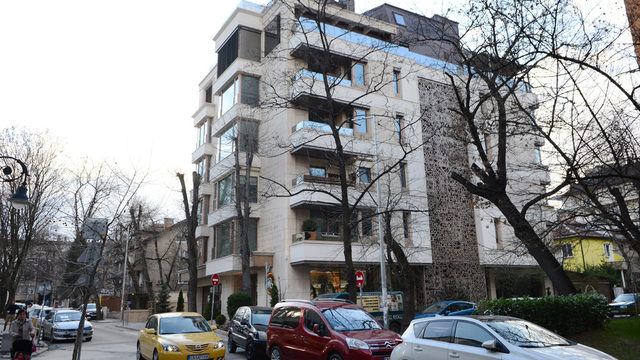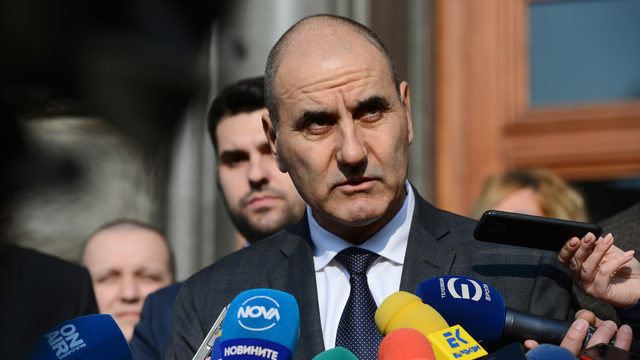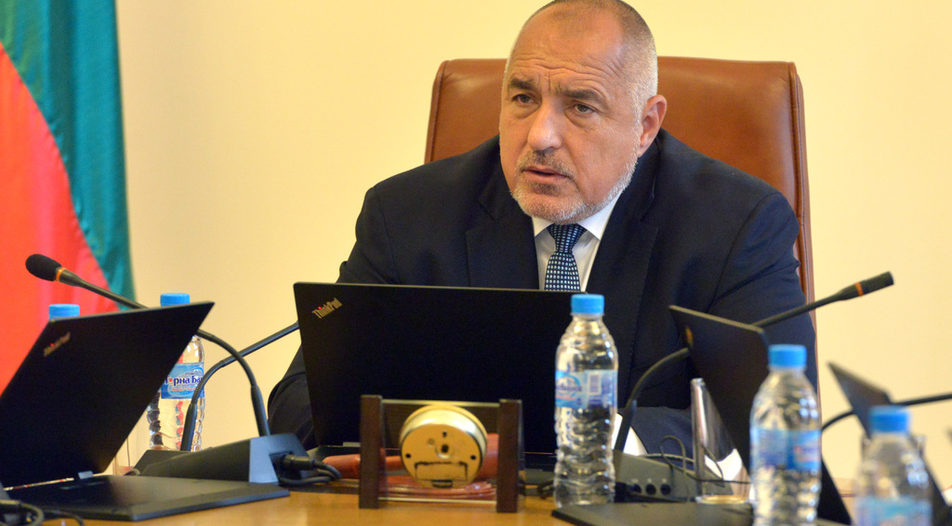In Bulgaria, large-scale public scandals shake up the country almost daily. From relatively mundane topics like the poorly executed multimillion repair works of Graf Ignatiev Street in central Sofia to the grand corruption schemes such as the siphoning of billions of levs from bankrupt Corporate Commercial Bank.
But they rarely lead to tectonic shifts and usually end up with resignations of lower-level officials and unknown members of parliament - "fuses", as they are notoriously called in Bulgarian. Then there are U-turns and everyone keeps a low profile until the next big scandal hits the fan and the last one gets swept under the carpet.
Yet one journalistic investigation into a relatively minor transgression (by Bulgarian standards) - the purchase of premium properties by high-level politicians, mostly but not exclusively from the governing GERB party, sent a shockwave bigger than anything affecting the Boyko Borissov-led governments over the past four years. Some of the scandal's effects, dubbed "Apartmentgate", have already been felt - they spurred two other investigations into real estate schemes by politicians that ended with eight resignations among the higher ranks of GERB and threatened the party's dominance at the European Parliament elections in May. However, the dismissal of Tsvetan Tsvetanov, the second-in-command in the ruling party, first from his parliamentary positions and more recently from all leadership posts he held with GERB, will lead to more profound shifts in the future - for better or for worse.
The apartments of doom
The saga began on 19 March this year. Then, the newly opened branch of the US-sponsored Radio Free Europe/Radio Liberty in Bulgaria, known as Svobodna Evropa, published an investigation that implicated Mr Tsvetanov in the purchase of a luxurious apartment below the market price of similar properties in the Iztok neighborhood of Sofia. The 240-square meters flat (315 square meters, if we count the two underground garages) with a private elevator was purchased from Arteks Engineering - a premium construction company.
The building won one of the 2017 Building of the Year awards (an annual architectural competition in Bulgaria) and the price of a publicly listed flat there stood between 2,500 and 3,000 euro per square meter. Meanwhile, Mr Tsvetanov declared that his apartment cost a mere 627 euro per square meter, according to the publicly available copy of the contract posted in the Real Estate Register which pegged the price of the deal at about 190,000 euro.
The story gets even more complicated here. The Tsvetanov family purchased their new home by exchanging two smaller furbished apartments they owned with an Arteks subsidiary and adding a 50,000-euro payment. In a single day, a notary approved the contract between the two sides and endorsed another deal that saw Arteks selling the two apartments previously owned by Mr Tsvetanov to a former member of his election staff, Simeon Velkov, for 235,000 euro. Strangely, the two flats sold by Mr Tsvetanov to Arteks for about 120,000 euro were re-sold for twice the price the same day.
Following the investigation by Svobodna Evropa, the Anti-Corruption Fund (ACF), Sofia-based anti-graft non-governmental watchdog, exposed further shady deals of high-ranking GERB figures with Arteks. It emerged that the Minister of Justice and ex-GERB nominee and runner-up in the 2017 presidential elections, Tsetska Tsatcheva, had also bought an apartment from Arteks at similar discount rates.
GERB MP and ex-Culture Minister Vezhdi Rashidov, as well as vice-Minister of Sport Vanya Koleva had also bought cheap flats in other Arteks buildings nearby. An inquiry by Sofia-based Bivol investigative journalism website found in subsequent days that Deputy Minister of Energy Krasimir Parvanov and Gergana Mutafova, a member of the Supreme Judicial Council, among others, had done likewise.
Heads start to roll
After initially parading various excuses, by 24 March three of the implicated cabinet members - Ms Tsatcheva, Ms Koleva and Mr Parvanov, filed their resignations, which were immediately granted by Prime Minister Boyko Borissov. Mr Tsvetanov, who was on a visit to the U.S. at the time, announced his resignation on 28 March.
Despite the resignations, high-profile GERB politicians have expressed little remorse. Mr Tsvetanov announced everything about the purchase was legal and he had nothing to fear from investigations launched by the prosecution and the Commission for Illegal Assets Forfeiture (CIAF). PM Borissov first tried to brush aside the issue and attacked his opponents from the Bulgarian Socialist Party (BSP) for also benefiting from undervalued real estate in the past. Later, however, he changed his tone, saying he was "furious".
Media outlets cozy with the government, initially reluctant to republish the story, then felt they had the green light. They then tried to implicate BSP politicians and other high office holders such as the chairman of the Supreme Court of Cassation Lozan Panov. Mr Panov's partner had also purchased cheap apartments in the past before marrying him. But this diversion tactic backfired and those media outlets took a more realistic line, exposing the upcoming rifts within the governing circles.
The battle moves on to the rooftop terrace
The cases of the six high-level politicians appeared a perfect training ground for the newly created anti-corruption body, CIAF. If the flats were purchased without "payment under the table", this would mean they were undervalued for tax purposes and Tsvetanov et al. ought to be investigated for attempted tax avoidance. If, on the other hand, they were purchased for the declared price, this would mean that high-level politicians have access to special deals which suggests influence peddling.
Yet, just as CIAF was warming up to launch their inquiries, Bivol and ACF released information that the very head of the agency, Plamen Georgiev, owned an apartment in the Sofia neighbourhood of Geo Milev that is much larger and pricier than he had stated in his assets' declaration.
The comparison made by ACF was based on Mr Georgiev's conflict-of interest-declaration and a publicly available offer for the same flat published on a real estate website in 2016. At the time, the 417-square meter flat was offered for 265,000 euro but when Mr Georgiev declared his ownership he said he had purchased a 204-square meter flat for only 146,000 euro. The three-storey apartment has a barbecue and a six-seater jacuzzi installed on the top floor that boasts a 186-square meter rooftop terrace.
Mr Georgiev claimed the terrace and all the luxury amenities there are shared with his neighbours, so trying to make it seem smaller. But neighbours said otherwise. The municipal construction supervision authorities later announced the CIAF head will have to demolish the amenities installed on the terrace because they had been built in violation of regulations.
This put CIAF and Mr Georgiev himself in a difficult situation, as they were already investigating the Apartmentgate scandal. Thus, on 4 April, just hours after PM Borissov urged him to take a leave while the scandal settles, Bulgarian Prosecutor-General Sotir Tsatsarov ordered investigations into property acquisitions by Mr Georgiev, the wife of Lozan Panov and the son of the director of the National Investigation Service Borislav Sarafov. The probes are to be conducted by the Supreme Cassation Prosecutor's Office and the National Revenue Agency. Mr Georgiev immediately complied, yet he claimed he was under attack by unnamed oligarchs and told reporters he "won't explain himself" further.
Two months later (and almost three months after the scandal broke) neither CIAF nor any other institution involved in the process, has published any results of their inquiries. Meanwhile, more problematic terraces emerged, notably those part of an apartment owned by Defense Minister Krasimir Karakachanov, leader of junior government coalition partner VMRO. Yet the investigators never launched probes against him. Prosecutor-General Tsatsarov, who was revealed by Capital Weekly to have purchased an allegedly underpriced villa, is also not under investigation, as it is unclear who can investigate the anti-corruption bodies even if there is the will to do so.
Why is it so serious?
This scandal rocked the Bulgarian political elite more profoundly than many other more substantial mishaps simply because the subject is dear to the average Bulgarian's heart. Homeownership is a pillar of Bulgarian society, regardless of social class and political leanings; it currently averages about 85%, compared to about 50-55% in much richer countries like Germany and Austria. Hence the affair resonated with the public more than any other corruption story.
Secondly, the scandal mattered because of the sheer number of GERB politicians implicated during a crucial election year. Last, but not least, this is the second time Mr Tsvetanov has been implicated in purchasing more expensive real estate than his declared finances allow. In 2010, just a year after GERB first entered government, it was revealed that Mr Tsvetanov owned six apartments. Yet a National Revenue Agency investigation failed to detect any problem.
On this occasion, voters were riled but seemingly insufficiently: GERB, which should have paid the price in the EU elections, still managed to entrench its position. That was mostly down to the still active mojo of PM Borissov who personally entered the campaign trail two weeks before the election, rallied his core voters and always kept himself at arm's length from his subordinates' misdeeds. Without strong opposition, which the Bulgarian Socialist Party seems incapable of mustering, Mr Borissov and his party remain unchallenged.
What are the implications?
Yet, Apartmentgate and everything that ensued is still extremely important. In more general terms, they showed that journalism can still rattle the seemingly untouchable echelons of the political elite. And second, the outrage can still rock the powerful, no matter how irreplaceable they might seem.
The scandal brought down key figures like Tsvetan Tsvetanov, Boyko Borissov's right-hand man in both GERB and parliament. Without him, it will be much harder for the prime minister to push through legislation in the National Assembly and continue his winning streak in elections. The first test will be in the autumn when key local elections take place.
Finally, the apartment scandals also revealed the impotency of Bulgaria's anti-corruption bodies, at least in their current shape, to exercise efficient and politically unbiased supervision.


In Bulgaria, large-scale public scandals shake up the country almost daily. From relatively mundane topics like the poorly executed multimillion repair works of Graf Ignatiev Street in central Sofia to the grand corruption schemes such as the siphoning of billions of levs from bankrupt Corporate Commercial Bank.












